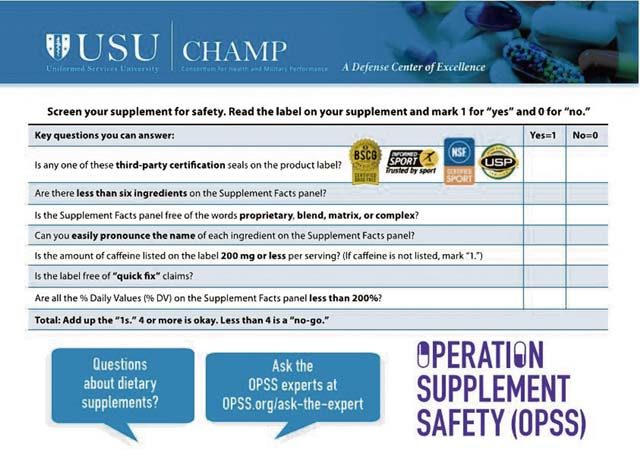by Senior Airman Sara Voigt
86th Airlift Wing Public Affairs

Supplement use has become common practice in recent years for individuals who wish to achieve high levels of fitness. There are a variety of supplements on the market for use, that advertise all sorts of glorified results and promises, and it’s important to know which ones you should be using, and which ones you shouldn’t.
So how do Airmen and their supervisors know if a supplement is safe or not? By using the Operation Supplement Safety website. Operation Supplement Safety is a DOD initiative that focuses on getting military members the information they need to make smart decisions when it comes to consuming dietary supplements, energy drinks, weight loss supplements and more.
“Some supplements tend to have promises on the label that aren’t verifiable with research. If there is a claim on the bottle that sounds really awesome, then it probably needs more investigation to verify if it’s a quality product,” said Capt. Miriam Seville, Ramstein Air Base Registered Dietician and Health Promotion Representative.
The OPSS website contains easily accessible information about supplement use, health risks, DOD and Federal Drug Administration prohibited ingredients, a supplement safety screening questionnaire (pictured above) and a forum to report side effects of supplements.
 There are four big things to consider when you or your Airmen are considering taking supplements.
There are four big things to consider when you or your Airmen are considering taking supplements.
1.) Supplements are not regulated by the government.
The FDA doesn’t take a supplement off the shelf until enough adverse reactions have been reported by product users. This means, if a harmful product enters the market, and a military member happens to take the unregulated supplement because they didn’t do adequate research, it could potentially cause severe health issues.
“Lots of supplement companies can generate a supplement at very low cost without testing the ingredients to make sure they are safe,” said Seville.
It is important to always check all ingredients and side effects before taking a supplement.
2.) Just because a product is sold on base, doesn’t mean it’s safe.
There are products out there that don’t list all of their ingredients on the label, leaving the consumer uninformed.
“If it’s sold on base, then it’s assumed to be a safe product, and I would say that most are, but there are so many supplements for sale; and it’s on the supplement company to do their due diligence to make a safe product, and that doesn’t always happen,” said Seville.
3.) Where you get your information from is critical.
Today there are many unreliable sources such as ‘Instagram fitness models,’ bodybuilding YouTube channels, and other websites that are unofficial that recommend products and supplement use.
“I encourage people to use and access real science vs. bro science. Don’t trust what you hear at the gym and do your research. Using the OPSS resource is a very wise way to go about human performance improvement in addition to accessing the resources we have on base,” said Seville.
4.) Supplements are meant to supplement, not replace.
“As a Registered Dietician I recommend that people get their nutrients from food, so a supplement should do exactly that, supplement. Not replace whole foods. For example, a protein supplement will not provide the maximum benefit to the user if he or she is not eating adequate energy from a variety of whole foods,” Seville added.
Using the information provided on the OPPS website and utilizing the resources on other DOD websites such as hprconline.org, can help to ensure Airmen are consuming safe, quality products that don’t put them at risk.
If you are interested in learning more about the supplements you, or the Airmen you supervise take, visit https://www.opss.org/.


